- India
- International
Medical college students fight taboos around menstruation using haikus in Kerala
'They said I was impure. I removed my uterus. They say I am sterile.'
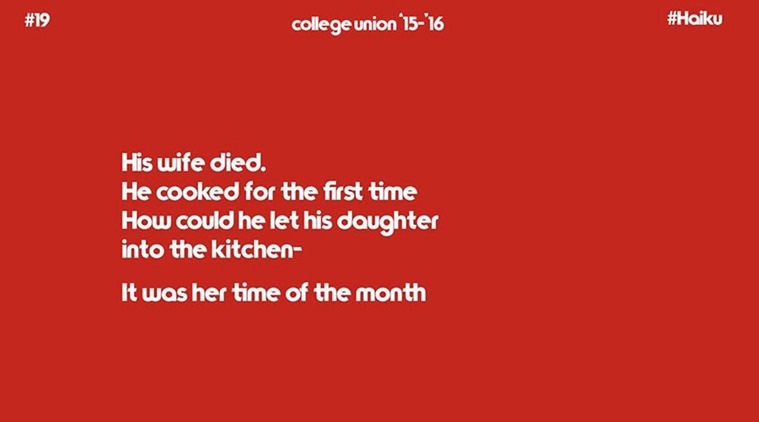 These students decided to break the stereotypes around menstruation in an innovative way. (Source: Sreya Salim)
These students decided to break the stereotypes around menstruation in an innovative way. (Source: Sreya Salim)
In a country where there are constant battles going on between overthrowing patriarchy and not upsetting ‘traditional values’, a group of students in Calicut Medical College in Kozhikode, Kerala, decided to do their bit on overcoming stigma and they did an amazing job at it. A third-year MBBS student James Paul and friends came up with the idea of using haikus to draw the attention of society to something that they have always been evading — the taboo that surrounds menstruation.
They started an intra-college event called the ‘Haiku: Micro Tales On Menstruation Taboos’, as their bit to support the internationally known ‘Happy to Bleed’ movement, ahead of the International Women’s Day, this March.
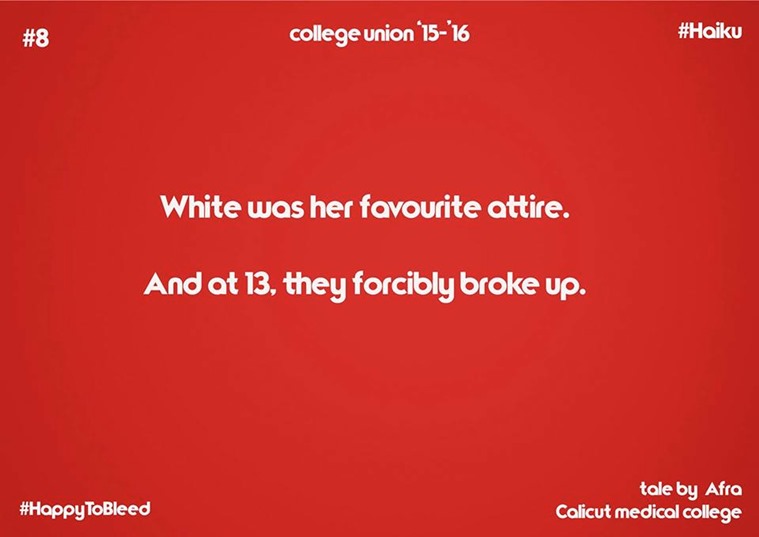 Afra from Calicut Medical College writes. (Source: Sreya Salim)
Afra from Calicut Medical College writes. (Source: Sreya Salim)
Traditionally, haikus are Japanese poems of just seventeen syllables. They are short poems that convey powerful messages. According to Sreya Salim, the student magazine editor of the college, the idea for using haikus as messengers was suggested in a literary club meeting when an intern challenged the students to walk across the college garden with an uncovered pack of sanitary napkins in hand. When nobody dared to come forward and accept it, the students realised how deep-seated was the taboo around menstruation penetrated by the society.
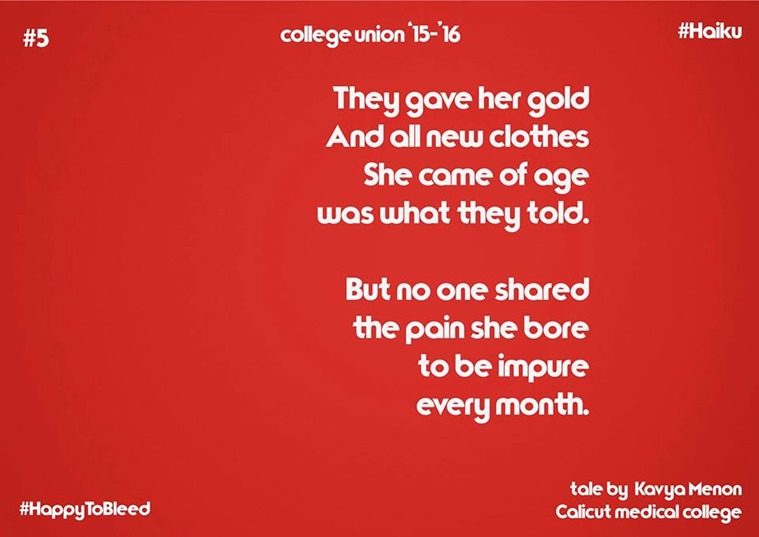 Kavya Menon from Calicut Medical College writes. (Source: Sreya Salim)
Kavya Menon from Calicut Medical College writes. (Source: Sreya Salim)
Talking to indianexpress.com, Sreya Salim, one of the torchbearers of the event, said that while girls would carry the sanitary napkins in black papers as though they are “secret weapons”, boys would simply not talk about it. “All my attempts to conduct a discussion in college on the ‘Happy to Bleed’ movement had gone futile since nobody considered this an important issue,” she said.
But once the event was announced, the response that it got was surprisingly tremendous. Though the project was initially meant to be just an intra-college competition, after receiving such an overwhelming response, the team was encouraged to think bigger. “Dipshi Khadeeja and Maiz Wafy worked late nights creating posters for the promotion of the movement. Sara Abraham, Farhan Hamidali and Arya Aneesh made use of social media to reach out to everyone,” Salim said.

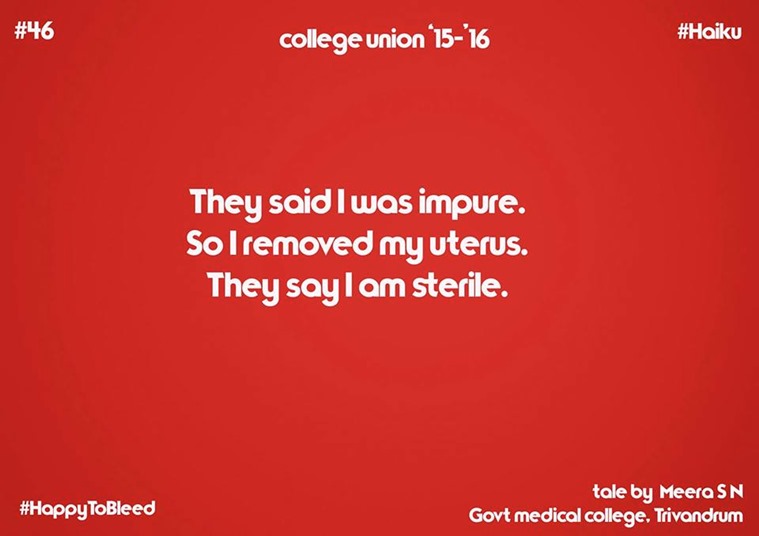 Meera S N writes from Trivandrum. (Source: Sreya Salim)
Meera S N writes from Trivandrum. (Source: Sreya Salim)
The posters the team made were widely shared everywhere and in just four days, the team got around 100 entries from people across India, which were then displayed proudly as posters on the college union’s Facebook page.
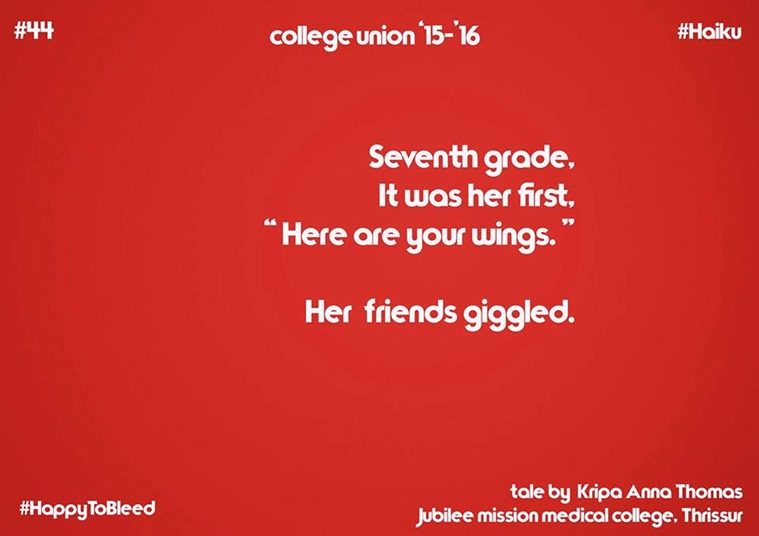 Kripa Anna Thomas from Thrissur writes. (Source: Sreya Salim)
Kripa Anna Thomas from Thrissur writes. (Source: Sreya Salim)
The widespread appreciation that the revolutionary movement received did not stop at that. “Nikita Azad, who started the ‘Happy to Bleed’ movement and Arjun Unnikrishnan, the founder of ‘The Red Cycle’ came forward to support the event,” Salim said. Later, a book was published compiling the selected entries.
ALSO READ: Women are #HappyToBleed, then what’s the problem?
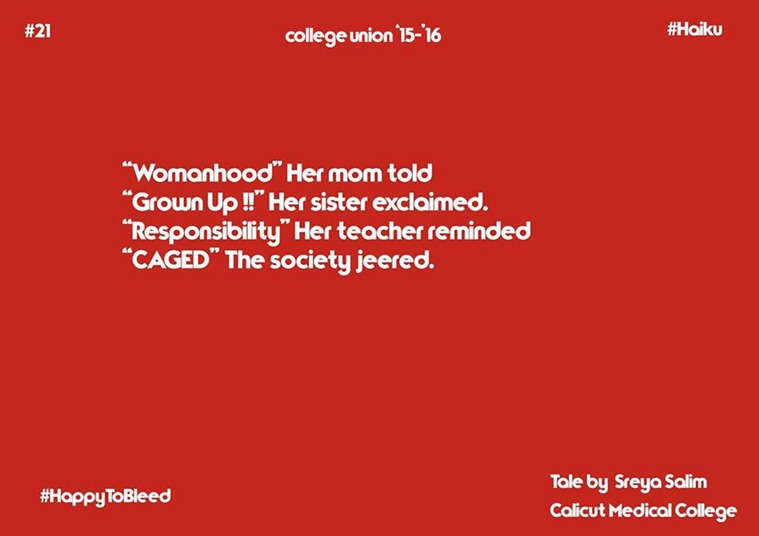 Sreya Salim writes from Kozhikode. (Source: Sreya Salim)
Sreya Salim writes from Kozhikode. (Source: Sreya Salim)
The haiku movement brought about a visible change the team saw in the attitude of people. Maiz Wafy, who handled the technical side of Haiku said, “Being from a conservative family, I felt awkward reading the entries in the beginning. After some conversations with my sisters and female friends in college, I got comfortable talking about periods openly.”
Salim, who was deeply involved in the project, said the greatest achievement of Haiku would be that it converted menstruation into a topic of open discussion in the campus. Even those who were against the event initially, later participated and gave full support, the 22-year-old said. “Once conversations started flowing freely, I found that women were more comfortable with speaking out. Haiku reminds us that a small act of courage can bring about a huge change,” Salim said.
Apr 19: Latest News
- 01
- 02
- 03
- 04
- 05





























